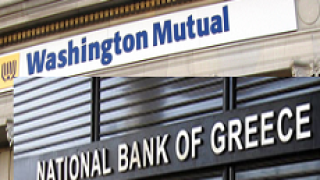-
Goldman is not the only US bank on the reputation radar this week. Wells Fargo’s sales scandal is a signal that, even in an industry as publicly loathed as banking (and we are well aware that the news media is another), reputation risk is to be taken seriously.
-
BNP Paribas has promoted one of its rising stars, underlining a new determination at the bank to translate its supremacy in the corporate banking sector into success across all of its investment banking products, writes David Rothnie.
-
Maturing deals issued by Washington Mutual and National Bank of Greece show covered bonds doing precisely what they're supposed to — redeem in full and on time.
-
European banks, especially the Italians, need to solve their non-performing loan problem, agrees everyone from the European Central Bank to the least informed finance hack out there. But the revelations coming out of Royal Bank of Scotland’s restructuring unit show it’s not always a pleasant process.
-
The ship has sailed on establishing a common EU approach to bank creditor hierarchies in insolvency. European authorities need to drop the now redundant pursuit of harmony in the pressing pursuit of clarity.
-
Deutsche Bank, its balance sheet and the market it operates in are worlds away from where major financial institutions stood in 2008 — so those scaremongering either have their own incentives for doing so or should know better.
-
Deutsche Bank is not simply too big to fail, it is too big to function. It's time to shrink.
-
Deutsche Bank jitters are spreading again, about seven months after the last round of panic washed over the troubled bank. The cause, this time, seems to be that German chancellor Angela Merkel ruled out a bailout, even if US regulators impose a settlement for RMBS mis-selling so large it threatens the solvency of the bank.
-
The prospect of the first international bank capital trade from India is closer with State Bank of India on the road this week for a dollar-denominated additional tier one. While it has picked a good window, it needs to get the pricing right or risk derailing the rest of the market.
-
Silk Road bonds are one of the latest gimmicks bankers are trying to promote with an event dedicated to the topic taking place in Hong Kong last week. While the concept of the bonds, linked directly to China’s ambitious Belt and Road initiative, is promising, proper guidelines need to be in place for the product to take off.
© 2026 GlobalCapital, Derivia Intelligence Limited, company number 15235970, 4 Bouverie Street, London, EC4Y 8AX. Part of the Delinian group. All rights reserved.
Accessibility | Terms of Use | Privacy Policy | Modern Slavery Statement | Event Participant Terms & Conditions
Cookies Settings





